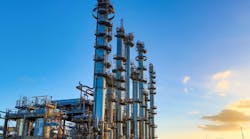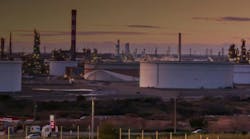By OGJ editors
HOUSTON, Mar. 4 -- The use of hydrogen for petrochemicals, renewable energy, and agricultural chemicals will escalate through 2007 as lawmakers enforce more stringent environmental legislation, Business Communications Co. Inc. said.
The Norwalk, Conn.-based BCC said total US hydrogen demand will increase to 14.45 tcf in 2007 from 10.96 tcf in 2002. This will amount to an average annual growth rate (AAGR) of 5.7%.
"High purity transportation fuels will become mandatory, and harmful chemical emissions will be drastically cut. Hydrogen will offer petroleum refiners, specialty chemical manufacturers, and automakers the flexibility they need to meet international agreements for cleaner products," BCC said in its report "Hydrogen as a Chemical Constituent and as an Energy Source."
Bulk petrochemicals-agricultural chemicals production will continue to represent the largest hydrogen demand, BBC reported. In 2007, this category will amount to 13.46 tcf, or 93.2%, of total demand, compared with 10.29 tcf, or 93.8%, in 2002.
"Over the forecast period therefore, hydrogen demand for petrochemical-agrochemical production will grow at an AAGR of 5.5% driven by new environmental legislation for clean transportation fuels that will become effective in January 2007," BCC said.
Merchant hydrogen also will experience increased demand, rising to 985.5 bcf through 2007 from 669.9 bcf in 2002 for an 8% AAGR. Merchant hydrogen demand was divided into industrial demand and renewable energy demand.
Industrial hydrogen demand is expected to increase to 743.7 bcf in 2007 from 479.5 bcf in 2002 for a 9.2% AAGR through 2007, up from a 5.3% AAGR during 1999-2002. The food and drink procession industry and metal manufacturers are using more hydrogen, BCC said.
The Environmental Protection Agency has proposed reducing the sulfur content in gasoline to 30 ppm by 2004, with diesel to follow. Refineries increasingly will turn to merchant suppliers for peak shaving, production trials, and plant start-up procedures.
Renewable energy hydrogen demand will increase to 241.8 bcf in 2007 from 190.4 bcf in 2002 for a 4.9% AAGR, up from a 0.9% AAGR during 1999-2002. The National Space and Aeronautics Administration is expected to consume large quantities of liquid hydrogen for construction of the international space station, BCC said.
Furthermore, commercialization of hydrogen fuel cells already is under way and BCC forecast that more than 1 million hydrogen vehicles will operate in the US through 2007, increasing the hydrogen market for renewable energy production.

